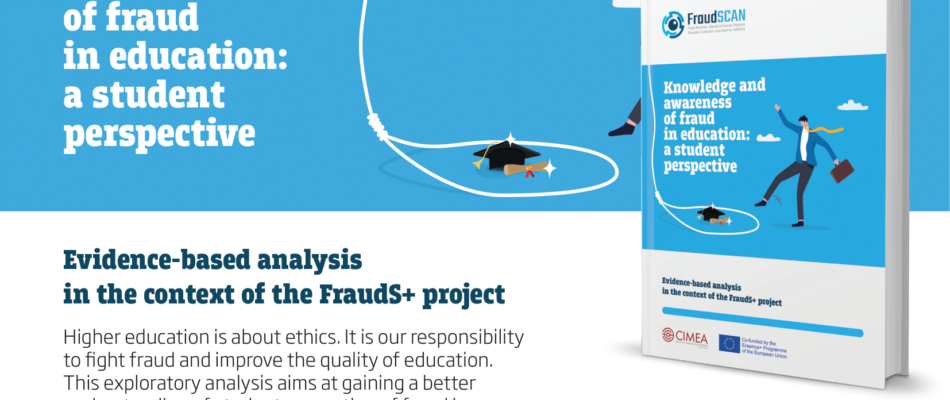
Knowledge and awareness of fraud in education: a student perspective
This exploratory analysis was carried out in the framework of the EU co-funded project FraudS+ “False Records, Altered Diploma and Diploma Mills Qualifications Collection” and aims to gain a better understanding of students’ perception of the phenomenon of fraud in education. This would constitute the empirical foundation for the creation of instruments directed towards the promotion of a culture of ethics and transparency in the greater academic community. Furthermore, by sharing information on the topic, the analysis has the objective of raising awareness on the phenomenon.
The FraudS+ project involves the ENIC-NARIC centres of six European countries, namely, Italy (coordinator), France, Germany, Ireland, the Netherlands and Sweden, as well as the European Students’ Union (ESU). ENIC-NARIC centres have been working on the issue of fraud in education for many years, collecting data and exchanging information, and they have been involved in several projects co-funded by the European Union aimed at developing strategies and tools for higher education institutions and credential evaluators, as well as detecting fraudulent qualifications or qualifications issued by diploma mills. With the project FraudS+, the ENIC-NARIC partners together with the European Students’ Union (ESU) are engaged in including students in the process. As a matter of fact, students are the first target of fraud in education, often misled to invest their time and money in fraudulent and useless qualifications.
In this light, the project proposed a questionnaire to students in their last year of upper secondary education, national and international university students, as well as student unions belonging to ESU in partner countries, in order to gauge their overall awareness on the matter, potentially enhance knowledge and provide more insight into the phenomenon of fraud in education. Therefore, taking into account the primary aspirations and objectives of the project, this exploratory analysis of the responses obtained from the survey would serve as an evidence-based starting point in laying the foundations for the creation of instruments aimed towards the promotion of the values which lie at the core of the FraudS+ project.
Tackling the issue of fraud in education not only means finding tools to detect and further prevent the spreading of fraudulent qualifications in higher education, but also promoting a culture of ethics and integrity. In this sense, together with higher education institutions, national authorities, relevant stakeholders in the field of higher education and students, ENIC-NARICs are also a part of the broader community of higher education, committed to sharing their experience in promoting international academic mobility in all its aspects and therefore supporting policies in cooperation with all the actors involved.
